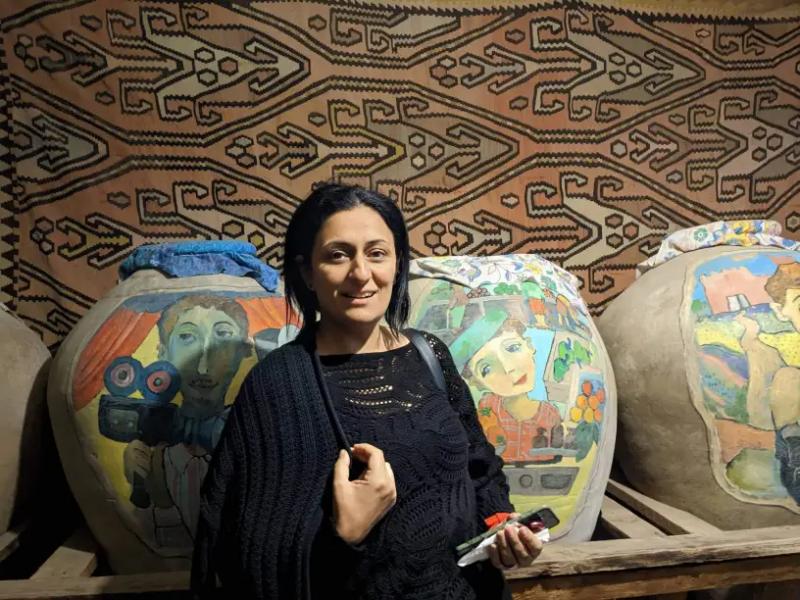The wording of voluntary attestation began to circulate in the republic 2.5-3 years ago. The presented concept was discussed in the Pedagogical Laboratory of the educational complex and in the councils of the schools. The educators were actively included in the discussions, responded to the public discussion, and took part in various platforms.
During the discussions, our stance was clarified: the educator of the author’s educational program should have the opportunity to participate in another option of voluntary attestation, determined by the approaches of the author’s educational program.
The methodical and pedagogical approach of questionnaires aimed at cramming and mechanical memory, flooded with complicated academic tasks, made up of dictionary exceptions, cannot and do not meet the requirements presented to the author teacher.
A specialist who has already got a higher professional education, should develop his/her skills already in concrete work, and present himself with his pedagogical skills and innovation. That should be the development. Pedagogical skills, their development, and the application of professional subject knowledge in pedagogy require other skills. The subject knowledge, which is supposed to have been acquired by the university graduate, should become a concrete pedagogical skill, the ability to transfer and direct it. The teacher must be able to create and carry out self-education with pedagogical and methodical developments and articles. He/she should be able to design his/her educational work, and formulate a subject and interdisciplinary project. The teacher must be able to read documents, observe, and create his/her own course plan and teaching materials. It is important that the teacher manage to become the author of his/her own work and present his/her achievements showing the development.
The Laboratory of the EduComplex developed the voluntary attestation procedure for the educators of the EduComplex according to the author’s educational program. The procedure was created, developed in the Pedagogical Laboratory of the EduComplex, went through various discussions, was polished, and revised in pedagogical councils of the schools and professional groups.
The already discussed, acceptable version was sent to the deputy minister of ESCS of RA. The goal was to confirm the right to exist as an alternative version of voluntary attestation. We have not received an answer yet.
In the educational complex, a decision was made to organize and implement our own version of the voluntary attestation of the EduComplex teachers with its own modest means.
The teacher of the author educational program is given the opportunity to choose which version he wants to participate in voluntary attestation: the one organized by the MESCS of RA or the one we have developed according to the author educational program.
Let’s single out a few important points from the order that we want to emphasize:
- The purpose of the attestation is to evaluate the applicant’s pedagogical activity for the last three years and change his/her rate of pay as a result.
- The attestation confirms that the applicant is the author of his work, the person responsible for the development of the author’s educational program, a creative, research specialist who is constantly developing his/her working abilities, pedagogical skills, subject knowledge, and horizon.
- To submit the application, the applicant opens a “Voluntary Attestation” category in his personal educational blog, publishing the submitted materials there.
The submitted materials highlight the open and transparent presentation of the teacher’s work which is visible to everyone. This is important both for observations, the transfer of experience, and for the evaluation of the work done. In the submitted materials, all the content principles of the author’s educational program are taken into account.
The teacher’s public presentation of his work and the organization of that public presentation are highlighted. In this regard, the requirements are also clear and specific. The teacher himself/herself organizes his/her own public presentation.
The development work was followed by the testing phase, after which appropriate corrections were made.
After circulating the already approved options, the announcement was made and the first applications were received. The Pedagogy Center of the EduComplex organized the work aimed at accepting voluntary attestation applications and public presentations.
Among the first applicants, Vardan Karapetyan, a teacher of studies, and Nune Movsisyan, a teacher of Armenian language and literature, were selected.
Their public presentations were impressive.
Vardan Karapetyan’s public presentation was on October 27 at 11:00, and Nune Movsisyan’s presentation took place at 14:00 on the same day.
After the first applicants, the number of applications increased. We are starting the next stage of public presentations and their evaluation. Both the public presentations and the assessment-observation phase are concrete and developing pedagogical work.
Our public presentations are open. Teachers, students, and their parents can participate in them. All beneficiaries can participate.
At this stage, we consider our voluntary attestation procedure to have been successfully developed. We also consider our experience to be interesting and worth spreading.
Translator: Yura Ganjalyan

